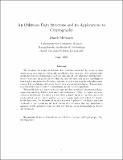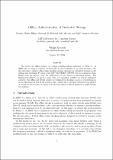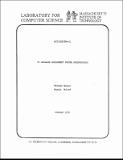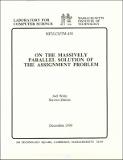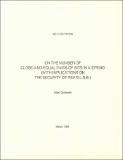Browsing LCS Technical Memos (1974 - 2003) by Title
Now showing items 299-318 of 492
-
Offline Authentication of Untrusted Storage
(2002-08)We extend the offline memory correctness checking scheme presented by Blum et. al [BEG+91], by using incremental cryptography, to detect attacks by an active adversary. We also introduce a hybrid o_ine-online checking ... -
On Bateson's Logical Levels of Learning Theory
(1975-02) -
On BPP
(1983-12) -
On Concentration and Connection Networks
(1981-03)This thesis deals with the structural complexity of swicthing networks which realize concentration and connection requests when operated in a rearrangeable or incremental manner. Some of the important results and constructions ... -
On Concurrent Identification Protocols
(1983-12)We consider communication networks in which it is not possible to identify the source of a message which is broadcastes through the network. A natural question is whether it is possible for two users to identify each other ... -
On Data Bases with Incomplete Information
(1979-10)Semantic and logical problems arising in an incomplete information data base are investigated. A simple query language is described and its semantics is defined, which refers the queries to the information about reality ... -
On Database Management System Architecture
(1979-10)Despite the many advances that have been made in the field of database management in the last two decades, in many respects the paradigm of database management has not changed much since its inception. Several long-standing ... -
On Linear Characterizations of Combinatorial Optimization Problems
(1980-02)We show that there can be no computationally tractable description by linear inequalities of the polyhedron associated with any NP-complete combinatorial optimization problem unless NP=co-NP -- a very unlikely event. We ... -
On the Complexity of Integer Programming
(1980-02)We give a simple proof that integer programming is in NP. Our proof also establishes that there is a pseudopolynomial time algorithm for integer programming with any (fixed) number of constraints. -
On the Complexity of the Theories of Weak Direct Products
(1974-01)Let N be the set of nonnegative integers and let < N ,+> be the weak direct product of < N,+> with itself. Mostowski[ 9 ] shows that the theory of < N ,*> is decidable, but his decision procedure isn't elementary recursive. ... -
On the Computational Complexity of Cardinality Constraints in Relational Databases
(1980-03)We show that the problem of determining whether of not a lossless join property holds for a database, in the presence of key dependencies and cardinality constraints on the domains of the attributes is NP-complete. -
On the Cryptocomplexity of Knapsack Systems
(1979-04)A recent trend in cryptographic systems is to base their encryption/decryption functions on NP-complete problems, and in particular on the knapsack problem. To analyze the security of these systems, we need a complexity ... -
On the Expressive Power of Dynamic Logic
(1980-02)We show that "looping" of while-programs can be expressed in Regular First Order Dynamic Logic, disproving a conjecture made by Harel and Pratt. In addition we show that the expressive power of quantifier-free Dynamic Logic ... -
On the Expressive Power of Dynamic Logic, II
(1981-08) -
On the Inapproximability of the Shortest Vector in a Lattice Within Some Constant Factor
(1998-01)We show that computing the approximate length of the shortest vector in a lattice within a factor c is NP-hard for randomized reductions for any constant c < ? (2). -
On the Massively Parallel Solution of The Assignment Problem
(1990-12)In this paper we discuss the design, implementation and effectiveness of massively parallel algorithms for the solution of large-scale assignment problems. In particular, we study the auction algorithm of Bertsekas, an ... -
On the Mathematics of Virus Shell Assembly
(1994-07)A local rule theory is developed which shows that the self-assembly of icosahedral virus shells may depend on only the lower-level interactions of a protein subunit with its neighbors, i.e. local rules, rather than on ... -
On the Numbers of Close-and-equal Pairs of Bits in a String (with Implications on the Security of RSA'S L.S.B.)
(1984-03)We consider the following problem: Let s be a n-bit string with m ones and n-m zeros. Denote by CEt(s) the number of pairs, of equal bits which are within distance t apart, in the string s. What is the minimum value of ... -
On the Redundancy Achieved by Huffman Codes
(1995-09)It has been recently proved that the redundancy r of any discrete memoryless source satisfies r < 1 -H(pn), where pn is the least likely source letter probability. This bound is achieved only by sources consisting of two ...
